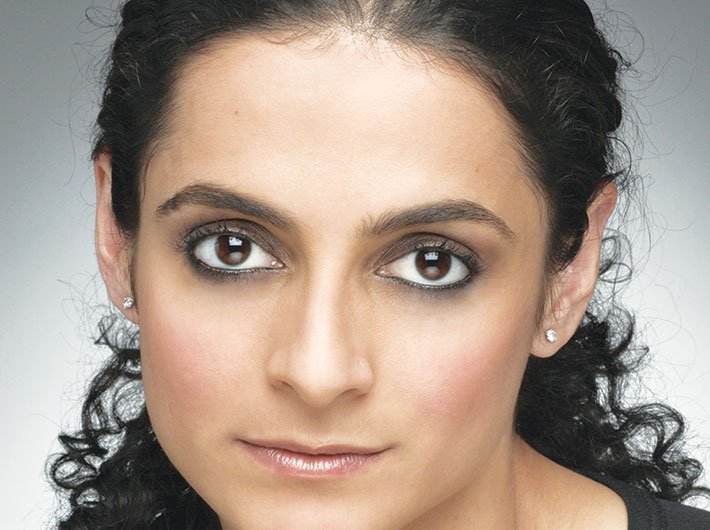Her plays Shikhandi and 07/07/07 received immense appreciation from critics.
Faezeh Jalali is an actor, director, playwright and dramatist who garnered appreciation after her role in Slumdog Millionaire. Her plays Shikhandi – The Story of the In-Betweens and 07/07/07 received immense appreciation from critics.
Your stories are unconventional, advocate equality and human rights. Why?
Whenever I create a work, I work on something that I value, and it has meaning for me. My work may or may not have an extension of the activism, but, it is the reflection of who I am and what I do. For me, theatre explores a kind of freedom in storytelling and its okay for me to take the risk of experimenting with form and content. I'm a theatre monk.
Tell us something about your initial days.
I never started working for theatre. It was always there in me. My journey as a theatre person began when I was four or five years old. In the first standard, we were asked to draw the person we wanted to become, and I drew an actor in a theatre space.
One of the nostalgia associated with the theatre is when I was seven-eight years old and wearing saree and costume and enacting, dancing around at home, my sisters and I would act out of those plays. Those childhood memories are still part of me. I was born to be a theatre artist. Professionally, the first step was when I got admission in an undergrad programme in the US.
What defines you better: A writer, director or an actor?
They all are part of me. The strongest part of me is a director. The determined portion of me is a writer, and the craziest part of me is the actor.
What do you think of your audience in the theatre?
The audience appreciates good play and hard work. The play needs to be engaging and entertaining for an audience to sit through for 90 minutes, otherwise, why would anyone come and feel sad for so long?
On a serious note, there is nothing really that we can do about the audience. Unlike movies, the theatre has its limitation and limited audience. In theatre, the artist can be only in one place at one time. I guess the only way forward is to go out on a limb first, to present excellent work that then gets audiences interest. Right now it is hard to convince the audience to come and watch our every show, but I am hoping that as we keep performing, people will keep build trust on my name and they will see my theatre without a second thought.
How can theatre be monetised?
Fund is a problem. It's challenging to convince a sponsor to put money behind you, unless you have a body of work or renowned name in the industry.
Arranging for the fund is a battle each time. We are forever trying to find ways to fund plays. There are so many expenses involved while practising and performing, such as costumes, makeup, props, create set, rehearsal, travelling, daily expense and many others. When we don't have producers, we don't have many options. We struggle to find good rehearsal space; many times theatre groups end up rehearsing at homes. Many groups end up being quite minimalistic to save costs.
Many times, I can't afford to pay actors for rehearsals, I feel bad, but, I don't have enough funds. Unlike cinema, here, actors end up being the most dispensable and lowest in the pay hierarchy. Those who are involved with the theatre are not for the money, but, we love the medium and love for acting. Once, the physical constraint of fund get ended it would inspire me to write more and involve more with the team.
Nowadays, theatre people are finding ways to work around the problem via crowdfunding and supplementing our theatre work with theatre-related jobs.
Why is it that you take a year to come up with a play when today full-fledged commercials films are made in three months or so?
Yes, I do need time. An artist needs to grow and apt with the play. Artist can't get trained in three weeks. In movies too, sometimes the director demands a particular skill-set from the actor. It could be six pack abs, learning specific dance style, learning ascent, reading a book or understanding the life of any particular person.
I work with a particular form, which involves well extensive research on developing a plot. For the Shikhandi, my actors learned Kalaripayattu, Bharatanatyam, Koodiyattam and Yakshagana forms, to use them as a gesture to explain the play. It takes time, and they can use these skills set in the future. A theatre meant for expressing physically, it existed in the actor's mind and seen through their expression and movement. Actors can't just come and read the line.
What inspires you as an artist?
Learning inspires me. I learn from the human relationships and surroundings. Try to understand the human communication, it is need not be vocal only, but, through body language. One day I could be sitting with a vada-pao seller, or a fish seller and theatre can evolve from it for me. It's about tapping the moment, and it could emerge. Art is spiritual. It comes to you. One can’t go to it. Hence, learning from our surrounding can make one to understand the different form of art and apt it in a particular style.
When I was younger, I wrote a lot of poetry, ideas, the stream of consciousness and kind of stuff. However, then I realise where my strength and intent lie and for that, I have to learn and read. Through it, I understand the process of elimination. What I want to do and what you I don't want to do. Learning is a never-ending and on-going process.
Choose yourselves between classist or modernist?
In between. I think contemporary stories need to be told. It’s not that I don’t like classical drama, but it has to be a piece I can relate to the present. As a director, I like the idea of ensemble work, the multiplicity of other lives.
What are you busy with at present?
Teaching at an acting school in Dehradun. I am enjoying working with students and learning new things from them every day. Apart from it, I am working on Vineet Bhalla's Farming story. It's a political commentary and very contemporary worldview. It would be in the staged this November.



